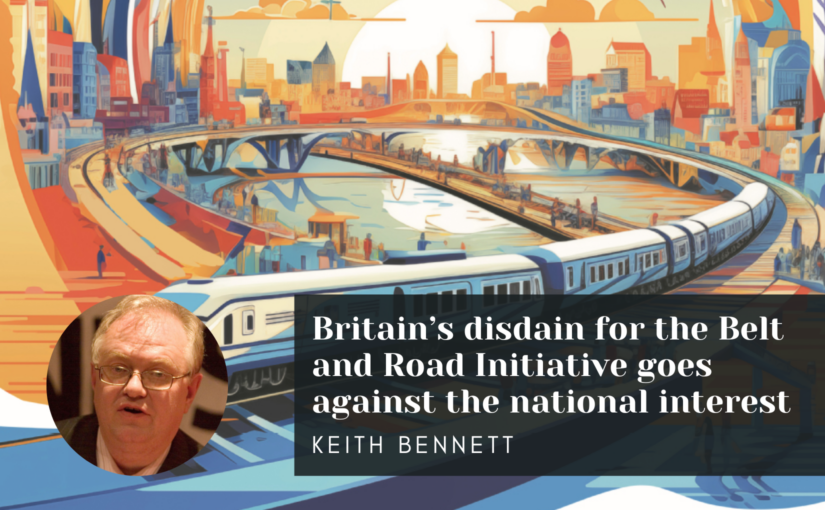In the following short op ed, which was originally published in China Daily, our co-editor Keith Bennett reviews the Belt and Road Initiative (BRI), 10 years after it was first proposed by President Xi Jinping.
He notes that BRI projects are becoming more focused, with an emphasis on avoiding waste and corruption, synergising with the development plans and priorities of the countries and regions concerned, ensuring both economic and ecological sustainability, and delivering real and tangible benefits to local people and communities.
Refuting the ‘China debt trap’ canard, Keith writes that China, has “no interest in some fanciful conspiracy that would only arouse the resentment of friendly countries and peoples with whom China has shared weal and woe for many decades, going back to the days of mutual national liberation struggles against colonialism and imperialism and for independence. Rather, talk of a ‘debt trap’ on the part of countries of the Global North is simply another instance of their ascribing their own behaviour to others.”
Noting that Britain could benefit greatly from participation in the BRI, he regrets that, unfortunately, the British government has chosen to follow behind the United States in its new Cold War against China.
The Third Belt and Road Summit for International Cooperation held in Beijing on Oct 18 was very timely because it coincided with the 10th anniversary of China first putting forward the initiative. In that time, the BRI has secured, to varying degrees, the support and participation of the majority of countries in the world and in the process has considerably extended beyond the first routes proposed. For example, it has drawn in countries in the South Pacific, West Africa, and Central and South America.
Moreover, as it accumulates experience, BRI projects are becoming more focused, with an emphasis on avoiding waste and corruption, synergizing with the development plans and priorities of the countries and regions concerned, ensuring both economic and ecological sustainability, delivering real and tangible benefits to local people and communities, and so on.
China lends to countries on favorable terms and is always sympathetic when they encounter difficulties. The very countries that talk the most about the so-called China’s “debt trap diplomacy” tend to be those holding most of the debt of the countries concerned – whether directly, through their private sector or through their disproportionate control over international financial institutions – and with the greatest historical responsibility for the plight of the Global South.
China has no interest in setting a “debt trap”. It lends on reasonable terms because without this, many developing countries would have no way to acquire the infrastructure and realize the modernization they so desperately need.
China responds to the needs and wishes of the countries concerned. It does not interfere in internal affairs, demand privatization, impose structural adjustment programs, instigate coups, or foment color revolutions. And it certainly has no interest in some fanciful conspiracy that would only arouse the resentment of friendly countries and peoples with whom China has shared weal and woe for many decades, going back to the days of mutual national liberation struggles against colonialism and imperialism and for independence. Rather, talk of a “debt trap” on the part of countries of the Global North is simply another instance of their ascribing their own behavior to others.
Britain could potentially benefit greatly from participation in the BRI, whether in terms of participation by British companies in projects in third countries or in terms of our own infrastructure needs. China was quite prepared to combine BRI projects with priorities identified by the UK, such as the Northern Powerhouse.
Unfortunately, the British government has chosen to follow behind the United States in its new Cold War against China. Meanwhile, the Northern Powerhouse has been abandoned, leaving the UK with progressively deteriorating and decaying infrastructure.
Last month, UK Prime Minister Rishi Sunak announced the abandonment of the Manchester link of the HS2 high-speed rail link, from London to Birmingham to Manchester, at his party’s recent annual conference in that very city. He then proceeded to make himself look even more ridiculous when his list of alternative projects was soon exposed as being comprised, in no small part, of projects that had either already been completed or abandoned. The UK’s disdain for the BRI clearly goes against the national interest.


The conspiracy to sever the UK commercial ties with China was run by the very same MP’s and industrialists, led by their American financial experts, who used the lure of trade with China as a prime reason for leaving the EU. No sooner was the ink dried on the EU referendum voting papers than they reversed course and began to oppose China very loudly and destroyed any hope of the UK achieveing a win-win comercial relationsship with China. With their strings being pulled by the USA they rejected Chinese 5G and let loose a deluge of anti-China propaganda across the UK news media. The dbet trap etc is an example of the nonsensical rubbish talked by these people as their rabid bigotry leads them to follow the US blindly in making military threats against China. In these actions they have destroyed the UK’s economy, and turned the UK into a pale shadow that dances to the whims of US foreign policy.